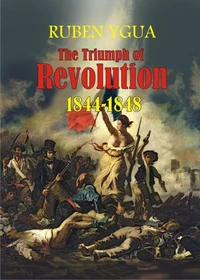The Greek people were conquered by the Ottoman Turks in the 15th century, but were never completely subdued, maintaining their cultural identity, largely thanks to the Orthodox Church. In the nineteenth century, French revolutionary ideals awakened strong nationalist sentiment throughout Europe, and a rapidly growing independence movement began among Greeks, largely due to the decline of the Ottoman Empire.
Over the previous three centuries, there had been attempts at insurrection which the Turks had succeeded in thwarting, until at the end of the 17th century, for more than thirty years, Morea was controlled by the Venetians and the Ottoman re-conquest in 1715 was unable to control the Greek nationalist agitation, which was encouraged by the Russians. When the French Revolution broke out, numerous Greek merchants and intellectuals in exile embraced the revolutionary ideals.
In Vienna, Rigas Feraios founded the newspaper Ephemeris, which demanded a republican constitution for the Greeks and other Balkan peoples, until it was finally closed down by the Austrian government and its owner deported to the Turkish Empire, where he was executed. In the first decades of the 19th century, the secret society Filiki Eteria was created, which was supported by foreign groups and strongly influenced by the Italian Carbonariam.
The Greek nationalist movement grew rapidly despite the fact that in Europe the great powers were determined to re-establish the old absolutist regime and fight the revolution. However, Greece became a dilemma for the Holy Alliance. If on the one hand the governments of Russia and Austria were fighting revolutionary movements in several European countries, on the other hand their interests led them to continue their secular policy against the Turks, supporting the Greek revolution.
That would mark the end of the Holy Alliance.
The Greek people were conquered by the Ottoman Turks in the 15th century, but were never completely subdued, maintaining their cultural identity, largely thanks to the Orthodox Church. In the nineteenth century, French revolutionary ideals awakened strong nationalist sentiment throughout Europe, and a rapidly growing independence movement began among Greeks, largely due to the decline of the Ottoman Empire.
Over the previous three centuries, there had been attempts at insurrection which the Turks had succeeded in thwarting, until at the end of the 17th century, for more than thirty years, Morea was controlled by the Venetians and the Ottoman re-conquest in 1715 was unable to control the Greek nationalist agitation, which was encouraged by the Russians. When the French Revolution broke out, numerous Greek merchants and intellectuals in exile embraced the revolutionary ideals.
In Vienna, Rigas Feraios founded the newspaper Ephemeris, which demanded a republican constitution for the Greeks and other Balkan peoples, until it was finally closed down by the Austrian government and its owner deported to the Turkish Empire, where he was executed. In the first decades of the 19th century, the secret society Filiki Eteria was created, which was supported by foreign groups and strongly influenced by the Italian Carbonariam.
The Greek nationalist movement grew rapidly despite the fact that in Europe the great powers were determined to re-establish the old absolutist regime and fight the revolution. However, Greece became a dilemma for the Holy Alliance. If on the one hand the governments of Russia and Austria were fighting revolutionary movements in several European countries, on the other hand their interests led them to continue their secular policy against the Turks, supporting the Greek revolution.
That would mark the end of the Holy Alliance.

 , qui est-ce ?
, qui est-ce ?